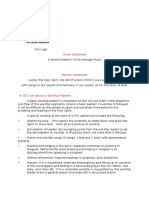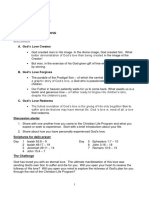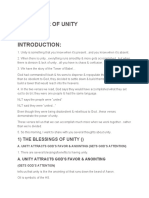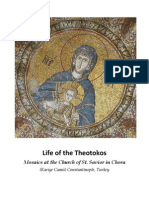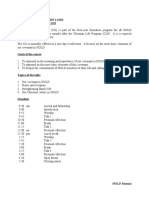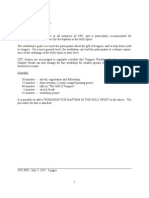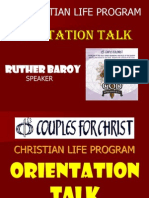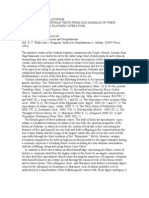CLP v2.0 - Session 4 The Christian Ideals Loving God and Neighbor
CLP v2.0 - Session 4 The Christian Ideals Loving God and Neighbor
Uploaded by
arcee alcedoCopyright:
Available Formats
CLP v2.0 - Session 4 The Christian Ideals Loving God and Neighbor
CLP v2.0 - Session 4 The Christian Ideals Loving God and Neighbor
Uploaded by
arcee alcedoOriginal Title
Copyright
Available Formats
Share this document
Did you find this document useful?
Is this content inappropriate?
Copyright:
Available Formats
CLP v2.0 - Session 4 The Christian Ideals Loving God and Neighbor
CLP v2.0 - Session 4 The Christian Ideals Loving God and Neighbor
Uploaded by
arcee alcedoCopyright:
Available Formats
1
SESSION 4:
THE CHRISTIAN IDEALS: LOVING GOD AND NEIGHBOR
THE CHRISTIAN LIFE PROGRAM v 2.0
MODULE 2: AN AUTHENTIC AND SPIRIT-FILLED CHRISTIAN LIFE
OVERVIEW OF THE SESSION
ANCHOR VERSE: “Jesus summed up the whole law in these two greatest commandments: You
shall love the Lord, your God, with all your heart, with all your soul, and with all your mind. This
is the greatest and the first commandment. The second is like it: You shall love your neighbor
as yourself. The whole law and the prophets depend on these two commandments.” (Mt.
22:37-40)
GOAL: To explain the meaning of the Christian ideals of loving God and loving neighbor, and
inspire participants to practice it
CORE MESSAGE:
Loving God and loving neighbor form the inseparable core of the Christian life. These two go
together. Loving God with our all heart, mind, soul and strength is our highest ideal. This is the
first and greatest commandment. But we cannot love God without loving our neighbor. We
love our neighbor not only as we love ourselves, but as God does.
TENOR: Inspiring
DYNAMICS:
1. Group Activity: What would a Christian do?
- The Team Leader narrates a scenario (pictures/video) and asks what would a
Christian do in each scenario.
- The participants answer by either acting it out or drawing it.
2. Talk Proper
3. Sharer
4. Reflection (Characteristics of Christian Love)
5. Group discussion
6. Assignment:
i. Read and reflect on the Characteristics of Christian Love
ii. Random Act of Kindness (RAK) Activity with family
iii. Choose an act among 7 corporal works of mercy which you think is
most relevant in your place.
Christian Life Program Version 2.0 Talk Outline
2
iv. Prepare ahead of time, after you choose the activity make a checklist
of what to do.
v. In choosing the place, make sure that the place where you will
conduct your RAK activity is safe for your children.
vi. After the RAK activity, share with your family their experience during
the activity.
vii. Take a picture and post it in your group chat or social media accounts.
If you decide to post it on social media, please use the hashtags:
#ChristianLove #RandomActofKindness #ChristianLifeProgram(name
of Chapter), #Year and #CouplesforChrist
e.g. #ChristianLifeProgramChristTheKing #2020 #CouplesforChrist
7. Announcement: Participants must bring their family/family picture next session.
SPEAKER’S PROFILE
The speaker is a CFC brother or sister who can explain the Christian ideals of loving God and
neighbor without sounding preachy or boastful, but inspiring our participants to respond to
God’s invitation
SHARER’S PROFILE
The sharer is a brother or sister who can testify to his/her faith journey in learning to love God
and neighbor
Christian Life Program Version 2.0 Talk Outline
3
SESSION 4:
THE CHRISTIAN IDEALS: LOVING GOD AND NEIGHBOR
THE EXPANDED TALK OUTLINE
FOR THE USE OF THE SPEAKER
INTRODUCTION
Loving God and loving neighbor form the inseparable core of the Christian life. These
two go together. Loving God is our highest ideal, the first and greatest commandment. But we
cannot love God without loving our neighbor. We love our neighbor not only as we love
ourselves, but as God does.
I. Loving God is our highest ideal.
a. Loving God with all our heart
The Biblical understanding of “heart” is the seat of intelligence and decision. In modern
English, it would be equivalent to “mind” or “will”. It includes intelligent thought and
will, along with feeling or emotion. The heart is the symbol of the core of who a person
is: “As one face differs from another, so does the human heart from another.” (Prov.
27:19)
To love God with all our heart means to be totally committed to him. It is a commitment
to seek the Lord first and foremost. It is a decision to put God first, to be loyal to him, to
place his will and interest above our own.
How do we put the Lord first and foremost in our life? By deciding to obey him. “If you
love me, you will keep my commandments.” (Jn. 14:15)
We need to develop a personal relationship with Him, arising from our dynamic and life-
giving relationship with Him as His sons and daughters. We should also spend regular
time with God in prayer and Scripture reading.
b. Loving God with all our mind and soul
We love God with all our mind and soul by keeping our mind clean and holy, free from
evil and impure thoughts (Mt. 5:28), from uncharitable thoughts (Mt. 7:1-5), from
suspicions that estrange relationships, and from worries knowing that God will take care
of us. We should be very discerning in the use of media that can influence our minds.
Christian Life Program Version 2.0 Talk Outline
4
What we read, watch and listen to, we hope, can help us become better Christian
spouses, parents, co-workers and servants.
Our decisions and choices must be guided by God’s Word and not by the ways of the
world.
We can love God with all our soul by being at the disposal of God for His purpose and by
thinking of ways to serve God. A model for this is St. Thomas Aquinas, Doctor of the
Church. He devoted his life reflecting, studying and writing about God, which led him to
achieve one of his life’s greatest works, the Summa Theologica.
c. Loving God with all our strength
Loving God with all our strength means giving God all our resources: time, talent, and
treasure, as what we call “ours” is not really ours but his.
We do not own our time, we merely manage it. Thus, we must seek God’s direction on
how we can spend it generously for his purposes like doing Christian service, visit the
sick, serve the parish, feed the hungry and many more.
In the Parable of the Talents, Jesus teaches us that if we do not use our God-given talent
for the kingdom of God, then whatever talent we have will be taken away and given to
those who use them rightfully. (Mt. 25:28-30) God asks for our treasure, wealth and
possessions not because he needs them, but to look into the disposition of our hearts.
God asks us to return to him what is his so that he might pour out even more blessings
upon us. He asks us to give to our tithes and alms. (Mt. 6:21, Mal. 3:10)
II. LOVING OUR NEIGHBOR AS OURSELVES
Our perfect models for loving God are Jesus and Mary. This love is made possible by the power
of the Holy Spirit. May we follow their example and be empowered by the Holy Spirit to love as
God loves.
a. Loving our neighbor is not an option. It is God’s commandment. And Jesus commanded
us to love others not only as we love ourselves but as he loves us: “I give you a new
commandment: love one another. As I have loved you, so you also should love one
another.” (Jn. 13:34) Love as Jesus loves.
b. The full depth of the meaning of Jesus’ teaching on loving our neighbor is revealed in
the Parable of the Good Samaritan. The story begins with a lawyer among the crowd
wanting to test Jesus by asking: “Teacher, what must I do to inherit eternal life?” Jesus
Christian Life Program Version 2.0 Talk Outline
5
responded with a question, “What is written in the Law?” The lawyer answered by
quoting Deut. 6:5 and Lev. 18:18, respectively, “Therefore, you shall love the Lord, your
God, with all your heart, with all your soul, and with all your strength” and, “Take no
revenge and cherish no grudge against your fellow countrymen. You shall love your
neighbor as yourself.”
The lawyer goes on, “Who is my neighbor?” So, Jesus related the parable to them. Jesus
took pains describing in great detail the Samaritan’s specific actions to help the victim —
“approached the victim”, “poured oil and wine”, “bandaged him”, “lifted him up”, “took
him to an inn”, “cared for him” — in order to convey the message that “being a
neighbor” entails “doing things” and not merely wishing others well.
c. “Who is my neighbor?” The responsibility of being a neighbor is upon us. The
perspective is not to ask others but to ask ourselves, “Am I being a neighbor to others?”
When we love our neighbor just as Jesus loves, we become a gift to others!
CONCLUSION
Loving God and loving neighbor have been likened to the vertical and the horizontal parts of the
cross. One directs us upward to God, while the other directs us horizontally toward our
fellowmen.
Loving God is not an easy task. In fact, it is impossible without God’s grace. But God will give it
freely and generously if we sincerely ask for it.
Jesus said that we should love one another as he loves us. He loves us regardless of who we
are. He does not care if we are rich or poor, educated or not, Samaritan or Jew. He died for all
of us. He is “neighbor” to us all.
GUIDE QUESTIONS:
1. Do you understand the Biblical meaning of love in contrast with that of the worldly
meaning?
2. How have you failed to love in everyday life?
Christian Life Program Version 2.0 Talk Outline
6
ANNEX 1:
ADDITIONAL REFERENCE FOR STUDY
FOR THE USE OF THE SPEAKER
HISTORICAL NOTE:
The Jews and the Samaritans hated and despised each other for many generations. It all started
after the death of Solomon in 922 BC. Israel was divided into two, the kingdom of Israel in the
north and the kingdom of Judea in the south. In 721 BC the Assyrians occupied the northern
kingdom. Then in 857 BC, the Babylonians conquered the southern kingdom of Judea. But in
529 BC, the Persian emperor Cyrus defeated the Babylonians and allowed the exiled Jews to
return to Judea.
In the meantime, the northern kingdom remained under Assyrian occupation. The Assyrians,
who were pagans, intermarried with the native population, including the Samaritans. And these
intermarriages went on for many generations. Thus in the eyes of the Jews who had returned
from exile in Babylon and who considered themselves as the only faithful interpreters of Israel’s
religious traditions, the Samaritans were half-breeds and half-pagans. As a result, the
Samaritans were prevented from worshiping in the Temple of Jerusalem. The Samaritans,
therefore, built their own temple on Mt. Gerisim. Then around 6-9 AD, a group of Samaritans
defiled the Temple court in Jerusalem by strewing it with human bones. This action led to
further division and even more bitter hostility between the Jews and the Samaritans. This
hostility and hatred between Jews and Samaritans were so intense that we read in the book of
Sirach 50:25-26: “My whole being loathes two nations, the third is not even a people.” Those
who live in Seir and Philistia, and the degenerate folk who dwell in Shechem. Mt. Seir is in the
territory of the Edomites. The Edomites and the Philistines were enemies of the Jews. Shechem
is a city in Samaria. As stated in the book of Sirach, the Jews did not even want to call the
Samaritans “people” (the third is not even a people…the degenerate folk who dwell in
Shechem). The Jews hated the Samaritans more intensely than the Edomites and the
Philistines, whom they had fought with regularly in their long history.
Christian Life Program Version 2.0 Talk Outline
You might also like
- CLP Version 2.0 Training MaterialsDocument50 pagesCLP Version 2.0 Training MaterialsJimPierreReyes94% (18)
- CFC HOUSEHOLD Prayer Meeting GuideDocument1 pageCFC HOUSEHOLD Prayer Meeting GuideRaymond De Ocampo100% (8)
- CFC Covenant Orientation Talk1Document39 pagesCFC Covenant Orientation Talk1rhemsis88% (8)
- CFC Household Leaders TrainingDocument63 pagesCFC Household Leaders TrainingVin Desilyo100% (15)
- CFC Covenant OrientationDocument26 pagesCFC Covenant OrientationNoli Graciano Jr.82% (17)
- Christian Life Program - CLP Team ManualDocument29 pagesChristian Life Program - CLP Team ManualPhilip Yambao100% (5)
- CLP v2.0 - Session 5 The Christian FamilyDocument8 pagesCLP v2.0 - Session 5 The Christian Familyarcee alcedo100% (7)
- CLP v2.0 - Session 5 The Christian FamilyDocument8 pagesCLP v2.0 - Session 5 The Christian Familyarcee alcedo100% (7)
- CFC Household Heads ManualDocument16 pagesCFC Household Heads ManualYmon Tualla100% (10)
- SFC CLP V2.0 ManualDocument74 pagesSFC CLP V2.0 Manualjhim letran100% (6)
- UnitLeaders ManualDocument11 pagesUnitLeaders ManualCnPrintDesignandPrintingNo ratings yet
- CLP v2.0 - Session 3 Repentance and Faith - CopyforCFCTrainersDocument5 pagesCLP v2.0 - Session 3 Repentance and Faith - CopyforCFCTrainersEve Castino-Quilas100% (4)
- Prayer Warrior GuideDocument9 pagesPrayer Warrior Guidepeterosuna67% (6)
- CFC HLT Talk 2 The HouseholdDocument112 pagesCFC HLT Talk 2 The HouseholdNet SparkNo ratings yet
- CLP v2.0 - Session 6 Empowered by The Holy SpiritDocument15 pagesCLP v2.0 - Session 6 Empowered by The Holy Spiritarcee alcedo100% (10)
- CLP v2.0 - Session 6 Empowered by The Holy SpiritDocument15 pagesCLP v2.0 - Session 6 Empowered by The Holy Spiritarcee alcedo100% (10)
- CLP v2.0 - Session 1 God - S Love - CopyforCFCTrainersDocument5 pagesCLP v2.0 - Session 1 God - S Love - CopyforCFCTrainersEve Castino-Quilas80% (5)
- CLP v2.0 Session 7 Growing in The Spirit CopyforCFCTrainersDocument8 pagesCLP v2.0 Session 7 Growing in The Spirit CopyforCFCTrainersEphraim Ramil Estoque67% (3)
- First Fruits Outline and ProcedureDocument6 pagesFirst Fruits Outline and ProcedureDolores Mercado De Leon100% (10)
- CLP v2.0 - Session 8 Transformation in ChristDocument7 pagesCLP v2.0 - Session 8 Transformation in Christarcee alcedo100% (6)
- CFC CLP TrainingDocument12 pagesCFC CLP Trainingbabyanang100% (6)
- New CFC Household Heads GuideDocument18 pagesNew CFC Household Heads GuideNoli Graciano Jr.82% (11)
- CFC Music Ministry GuidelinesDocument6 pagesCFC Music Ministry GuidelinesNashDelosSantos86% (7)
- CFC Chapter Heads ManualDocument16 pagesCFC Chapter Heads Manualbabyanang75% (4)
- Guidelines For Personal Dialogues (One To Ones)Document3 pagesGuidelines For Personal Dialogues (One To Ones)Steve Jhonson Lepasana78% (9)
- The Covenant Orientation Weekend Manual - v2011Document53 pagesThe Covenant Orientation Weekend Manual - v2011Errol Macapagal Cayabyab93% (14)
- Chapter Leaders ManualDocument19 pagesChapter Leaders ManualCnPrintDesignandPrinting100% (1)
- HANDOUTS Revised CLP TalksDocument12 pagesHANDOUTS Revised CLP TalksEleazar Mendoza89% (9)
- CLP v2.0 - Session 2 Who Is Jesus ChristDocument12 pagesCLP v2.0 - Session 2 Who Is Jesus ChristEve Castino-Quilas100% (2)
- Dialogue-One On One CFCDocument7 pagesDialogue-One On One CFCJoana Amparo100% (1)
- CFC Unit Leaders TrainingDocument57 pagesCFC Unit Leaders TrainingSarah Jane-Shae O. Semblante100% (28)
- MER1-Participants ManualDocument17 pagesMER1-Participants ManualJoram Ray Obiedo100% (5)
- CFC Foundations For Christian LivingDocument62 pagesCFC Foundations For Christian LivingEleazar Mendoza100% (1)
- Praying Over Session Talk 9Document4 pagesPraying Over Session Talk 9Christopher Pontejo100% (8)
- CLP Module 1 Participants HandoutsDocument4 pagesCLP Module 1 Participants HandoutsAngel Polintan100% (1)
- CLP v2.0 - Session 2 Who Is Jesus ChristDocument12 pagesCLP v2.0 - Session 2 Who Is Jesus ChristEve Castino-Quilas100% (2)
- The Power of UnityDocument9 pagesThe Power of UnityCarlo B CagampangNo ratings yet
- CFC CLP Training Talk 2 ExpandedDocument2 pagesCFC CLP Training Talk 2 ExpandedNoli Graciano Jr.89% (9)
- CLP One To One GuidelinesDocument3 pagesCLP One To One GuidelinesRyan Aimel Estandarte86% (7)
- CFC Covenant Orientation TALK 4Document5 pagesCFC Covenant Orientation TALK 4Jefferson Pimentel100% (7)
- CFC MerDocument27 pagesCFC MerRobert PaulNo ratings yet
- Covenant Orientation Weekend - Talk 2Document29 pagesCovenant Orientation Weekend - Talk 2MaanMai100% (2)
- 300 Cubits (Hebrew) : 2006 BC 2006 AD 1 AdDocument1 page300 Cubits (Hebrew) : 2006 BC 2006 AD 1 AdMike AlexNo ratings yet
- Orthodox Christianity Life of PanayiaDocument20 pagesOrthodox Christianity Life of PanayiaElenie100% (10)
- Ophiel VignettesDocument141 pagesOphiel VignettesRaul JimenezNo ratings yet
- Working With Angels - Flowing Wi - Steven BrooksDocument234 pagesWorking With Angels - Flowing Wi - Steven BrooksKoumetio Bryan100% (6)
- CLP v2.0 - Session 7 Growing in The SpiritDocument8 pagesCLP v2.0 - Session 7 Growing in The Spiritarcee alcedo100% (3)
- Recommended Songs For CLPDocument2 pagesRecommended Songs For CLPNoggie Espina Lorenzo100% (10)
- Covenant Orientation - Talk No. 3Document30 pagesCovenant Orientation - Talk No. 3Sammy_Cruz100% (9)
- 3.1 HOLD Covenant Orientation ManualDocument29 pages3.1 HOLD Covenant Orientation ManualREINNEA FELICIANO100% (5)
- CFC Household Heads Manual 2Document14 pagesCFC Household Heads Manual 2Jaime BaldescoNo ratings yet
- CLP Songs SuggestionsDocument2 pagesCLP Songs Suggestionsarcee alcedo100% (2)
- CFC Tongues WorkshopDocument10 pagesCFC Tongues WorkshopFreddie Cuevas Ligutom100% (5)
- CLP Expanded Outline New VersionDocument147 pagesCLP Expanded Outline New VersionKent Kyle Ferriol100% (3)
- CFC - CLP Training Talk No. 1 by SamCruzDocument41 pagesCFC - CLP Training Talk No. 1 by SamCruzSammy_Cruz100% (4)
- Talk No. 2: What Is CLP?: Bro. Law ManimtimDocument22 pagesTalk No. 2: What Is CLP?: Bro. Law ManimtimLlednew Lavodnas100% (3)
- CLP Orientation TalkDocument39 pagesCLP Orientation TalkChristopher Pontejo100% (8)
- CFC Team LeaderDocument35 pagesCFC Team LeaderGary Delantar77% (13)
- HoldDocument16 pagesHoldybun100% (1)
- Christian Ideals Loving God and Loving NeighborDocument6 pagesChristian Ideals Loving God and Loving NeighborLeo ManceraNo ratings yet
- St. Francis Parochial School Talisay, Camarines Norte: Module in Gr. 12 Augustinian Spirituality 'Document8 pagesSt. Francis Parochial School Talisay, Camarines Norte: Module in Gr. 12 Augustinian Spirituality 'Nick Lawrence Bermudo LibriaNo ratings yet
- CLP Talk 05 - Thie Christian Ideal Loving GodDocument5 pagesCLP Talk 05 - Thie Christian Ideal Loving GodRitche MamangunNo ratings yet
- G9 Up1lp2Document11 pagesG9 Up1lp2josedizonNo ratings yet
- Two Great CommandmentsDocument10 pagesTwo Great CommandmentsAdoremus DueroNo ratings yet
- The Christian Ideal: Loving God: Talk No. 5Document3 pagesThe Christian Ideal: Loving God: Talk No. 5Johna YuroNo ratings yet
- Talk 2 CALLED TO WITNESSDocument5 pagesTalk 2 CALLED TO WITNESSVoltaire Villanueva100% (1)
- Loving God and Christian LoveDocument34 pagesLoving God and Christian LoveChristine Marie SalamatNo ratings yet
- CLP Songs SuggestionsDocument2 pagesCLP Songs Suggestionsarcee alcedo100% (2)
- CLP Form - FormDocument1 pageCLP Form - Formarcee alcedoNo ratings yet
- Charismatic WitchcraftDocument10 pagesCharismatic WitchcraftJune Leith100% (1)
- Gnosticism and PlatonismDocument25 pagesGnosticism and PlatonismPedro Segarra100% (1)
- DIUdraft 2 BDocument16 pagesDIUdraft 2 BSa LakNo ratings yet
- The Four Apocalyptic HorseDocument40 pagesThe Four Apocalyptic HorseRepentance HolinessNo ratings yet
- 2014 Advent Hymns ReferenceDocument4 pages2014 Advent Hymns ReferenceBabaji BautistaNo ratings yet
- 840 Frequently Asked Words With SentencesDocument246 pages840 Frequently Asked Words With SentencesMohana PriyaNo ratings yet
- Reading the Scriptures Archives - Orthodox Church QuotesDocument14 pagesReading the Scriptures Archives - Orthodox Church QuotesBenedict PangNo ratings yet
- Our Finest Hour-Sermon NotesDocument9 pagesOur Finest Hour-Sermon NotesJoshua L. Jensen100% (1)
- 16 WAYS To Practice Agape LoveDocument3 pages16 WAYS To Practice Agape LoveTheresa SuleNo ratings yet
- Qur'an & Human BodyDocument4 pagesQur'an & Human Bodynoelbaba71No ratings yet
- 34.5 Letters To The 7 Churches ChartDocument1 page34.5 Letters To The 7 Churches ChartLuis MelendezNo ratings yet
- A Greek Grammar of The New Testament A Workbook Approach To Intermediate GrammarDocument230 pagesA Greek Grammar of The New Testament A Workbook Approach To Intermediate GrammarZomiLinguistics100% (2)
- 4 5818708670556407373Document145 pages4 5818708670556407373Derek Dixman ChakowelaNo ratings yet
- A Handful of Rice To Feed The Multitudes - John LalnuntluangaDocument6 pagesA Handful of Rice To Feed The Multitudes - John LalnuntluangajohntluangaNo ratings yet
- Seeds of Wisdom On Habits Mike MurdockChristiandietcom - NGDocument68 pagesSeeds of Wisdom On Habits Mike MurdockChristiandietcom - NGPrincess AwesomeNo ratings yet
- Le Devoilement Des Effets Du VoyageDocument4 pagesLe Devoilement Des Effets Du VoyageBbaggi BkNo ratings yet
- Kol Hamevaser - Academic TalmudDocument8 pagesKol Hamevaser - Academic TalmudDaniel SultanNo ratings yet
- Biblical Lesson-WPS OfficeDocument4 pagesBiblical Lesson-WPS OfficeRomer MaddelaNo ratings yet
- Jung History II - 2Document36 pagesJung History II - 2Данијела Вукмировић100% (1)
- The Importance of Discipleship and GrowthDocument5 pagesThe Importance of Discipleship and Growthrafael_caisipNo ratings yet
- How To Practice Self-AwarenessDocument14 pagesHow To Practice Self-AwarenessAngel Nicole SicatNo ratings yet
- Edited Final RG & Dana Wedding Script MC & Time Line v3.0Document11 pagesEdited Final RG & Dana Wedding Script MC & Time Line v3.0Nel Rey May ArengaNo ratings yet
- 2014.11 BoxandSpoon PDFDocument17 pages2014.11 BoxandSpoon PDFHoly Anargyroi Greek Orthodox ChurchNo ratings yet
- Sidney W. Tymeson S: Outh Lancaster AssachusettsDocument464 pagesSidney W. Tymeson S: Outh Lancaster AssachusettsjosephNo ratings yet
- Lesson 1 Introduction To HermeneuticsDocument2 pagesLesson 1 Introduction To HermeneuticsJett Rovee Navarro100% (1)




















